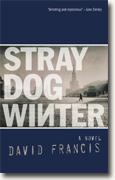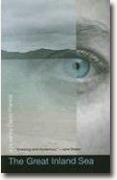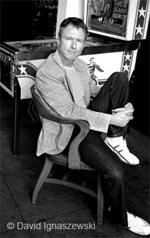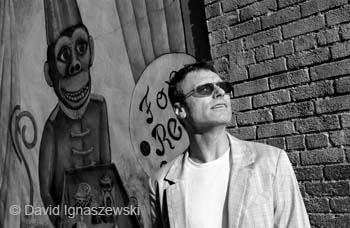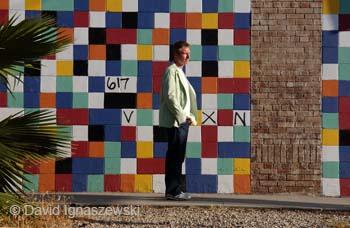author interview
book reviews:
· general fiction
· chick lit/romance
· sci-fi/fantasy
· graphic novels
· nonfiction
· audio books
· author interviews
· children's books @
curledupkids.com
· DVD reviews @
curledupdvd.com
newsletter
win books
buy online
links
home
for authors
& publishiss
for reviewers

|
|||||
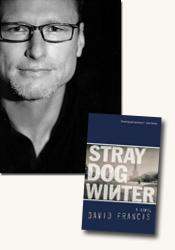 
Contributing editor Michael Leonard interviewed Stray Dog Winter Interviewer Michael Leonard: Stray Dog Winter David Francis: Back in Australia, I had an Aunt Ruth with whom no one in my family dared speak. Apparently she'd slept with various American soldiers under the cypress hedge when they'd visited the farm during the war. Aunt Ruth ended up in Kenya but returned to Australia in the late sixties. I saw her only once - she lay on a chaise and ordered me: “Boy, get me a gin and tonic.” I was six. My mother's umbrage was obvious but my father seemed secretly fascinated by his glamorous drinking sister-in-law. Decades later, having finished The Great Inland Sea, my first novel, I was in Paris on a fellowship from the Australian Literature Fund. There in my studio, I had a dream that my father had an affair with Aunt Ruth and that together they had a daughter.
I stayed in Moscow during the end of the Soviet era. My memories of the train trip from Prague and the palpable fear that pervaded the faces of the people, that hung like a blanket over the culture, was fascinating, like nothing I knew from Australia or anywhere else I’d been. The look and feel of the place stayed with me until I envisioned Fin there, and Darcy traveling to meet her. So the setting in that moment in Soviet history is more by accident than design, but still a function of the time I visited and the vivid shards of memory evoked. I am drawn to the kinds of beauty and strangeness that exist in stark and unusual emotional and physical landscapes, like Day, the boy in the Australian outback in The Great Inland Sea, and now Darcy trundling naively into the Moscow winter. It is the same way that I find an odd kind of beauty in the blandness of Los Angeles, the place I return to from Paris or the farm in Australia, and call my home.
What do you think lies at the heart of Fin and Darcy’s connection to one another? Fin and Darcy are mirrors of the masculine and feminine in each other, as closely related as they could be without being siblings, sharing a father and with mothers who are sisters. But they are connected by more than blood. “They came from a country of their own. It had two inhabitants.” Darcy is fascinated by her and has grown up in her thrall, admiring the way she seems unaffected by others or their childhood. Both emotionally and physically, he follows her into a place he’d never otherwise have gone, knowing he would go as much as his instincts tell him he shouldn’t.
Darcy has been plotting his escape from Australia since he was a boy - he’s running from his family, his alcoholic mother and philandering father, the loneliness and isolation of both his present and his past, and also from his fear about his sexual proclivities in the early days of “the new gay cancer.” He’s drawn to an adventure in a culture he can barely fathom and knows little about, but he feels like he has nothing to lose. And Fin draws him to go even though he’s just been accepted for the fine arts course at Sydney University. She persuades him to defer, seduces him as usual. “Come paint here,” she says, “I need you…we’ll have fun.”
When Darcy arrives in Moscow, he notices how Fin seems somehow uneasy – “she usually found everything funny.” And while Darcy is used to sharing adventures with her, the family secrets only she knew, he decides not to mention his encounter in the station in Prague. As he realizes there are things she’s not telling him, he decides he might need secrets of his own, and, in that choice, the divide between is seeded, the beginnings of their mutual mistrust. You paint Darcy and Fin’s past as filled with beauty and eroticism, but also sadness, loneliness and loss. Darcy in particular seems haunted. How do you think Darcy’s relationship with is alcoholic mother and his erotic encounter with the Mormon missionary affected the choices that he makes later in life? Darcy experiences what might now be coined a kind of “emotional incest” with his mother, the way he becomes the “substitute husband” and how subtly his mother both dotes on Darcy and uses him - he pours her drinks, walks around the house as if on egg-shells. His parents are unable to model anything in the way of intimacy, except in confusing ways. For example, the time Darcy feels his mother’s bare toe stroking his calf under the table, “a quiet back-and-forthing,” while she cruelly relays the story of the missionary to Darcy’s unsuspecting father. Darcy, who is compelled by the missionary’s attention, “compelled in a way he doesn’t understand,” becomes imprinted by the experience. It electrifies Darcy mysteriously and he misconstrues it for a true intimacy, an intensity he tries to replicate in his later adventures, with “ever-decreasing returns.” Literature and art are powerful forces that reverberate throughout. It’s a language that only Fin and Darcy seem to share. How important is art to both Darcy and Fin? Darcy is the “one with the painterly hand” while Fin has done more in the way of feminist/political installations - what she called The Burning of the Witch-Hunt Manuals, books in an incinerator. She said it was about The Malleus Maleficarum, “a book, she said, but Darcy’d never heard of it.” And it seems odd to Darcy that she gets this fellowship to paint, but then he is summonsed there to do the actual painting. Later, he finds out how she got the fellowship in the first place, and why she used it to get into Moscow.
Darcy is, in a sense, an adrenaline junkie and what might now be coined a “love junkie,” even though it might seem like love could not be found where he seeks it. But it’s a desire to escape his feelings of estrangement and isolation by connecting with strangers, as a counterfeit of intimacy, arguably ignited by the missionary. Still, it’s not that the missionary made him gay - it seems that Darcy was always gay, but the encounter with the missionary changed the way his sexuality manifests. This becomes part of his struggle. While he is able to give up drinking relatively easily “it was encounters with strangers that rattled him still, compelled him.
As a ballet lover, I adored the scene at the Bolshoi Theatre where Darcy gets to see not only the Russian ballet, but his also first glimpse of Anyetta Chernenko, a pivotal character in the following drama. What inspired you to include this scene in the story? I went to the Bolshoi Theatre when I was in Moscow and so began a scene with Fin and Darcy there. “Five balconies ranged up above the orchestra level like a pile of shining ashtrays.” Fin points at the chandelier and tells Darcy it’s famous, two tons of crystal floating above them. “Why are we the only ones under it?” he asks. He imagines carnage: a crystal indoor Hindenburg, their bodies impaled on the red velvet seats.” All red and gold, and this elegant woman, who transpires to be Chernenko’s daughter, who’s up in a box with a group of grey-suited men. And then in the middle of The Lady with the Dog, Darcy gets bored and takes his leave and has his first sighting of Aurelio, a shadow in the bathroom door. “A man in his thirties with hazel eyes, Latin-looking, he seemed to smile but his lips didn’t move, and then he was gone.” Later, when Darcy actually meets Aurelio, the Cuban dancer seems more preoccupied than dangerous. He warns Darcy that it is his job to “know many things,” including Darcy’s movements. There’s a hint that something is not quite right. Why, then, does Darcy continue to see him? What do you think he sees in Aurelio? Is it just lust? Darcy is already so off-kilter in Moscow (Fin not being like he’s used to, nothing being not quite what it seems) that he’s attracted to Aurelio, not merely as a distraction, or for his obvious beauty, but in hopes of an ally, a means of trying to fathom what’s going on. So he seeks a connection elsewhere, which, sadly, brings perils of its own. But it’s more than just lust and naïveté, it’s another search for connection and understanding. Also, Aurelio is a dancer, and so there’s an attraction to his talent, to another artist, and what might be described as “a desire to be saved by those who need saving themselves.” Aurelio is certainly a complex and enigmatic personality, a “gay Catholic communist” who seems to be “larger than the life that surrounded him,” where did you get the inspiration for Aurelio’s character? In 1982, when I was in Paris on the writing fellowship, my studio at the Cité International des Arts looked out over the French national dance academy. I was endeavoring to write but staring out the window at these dancers in rehearsal. Then I met one and fell in love. Later on, I found Aurelio appearing as a character in the book, as a lure for Darcy. But Aurelio is in fact an amalgamation of the dancer from Cameroun, a Venezuelan model friend who lived in Paris, plus an architect friend from Buenos Aires - all kind of rolled into a Cuban called Aurelio.
Fin doesn’t know what Aurelio’s deal is, and even though she’s warned Darcy “don’t trust anyone here,” he pursues Aurelio almost in spite of Fin. So Fin is both jealous and protective, but also wary - she has a lot to protect, much more than Darcy knows. When Darcy tells her he’s been invited by Aurelio to a dacha in the country, she tells him: “You can’t just go to the country, there are checkpoints.” But Darcy guesses it’s more than that—she doesn’t want him finding friends of his own. Moscow is her city, and she doesn’t exactly trust Darcy’s judgment (not without reason, it transpires). Overriding all this are her serious reasons for not wanting anyone else in their business, neither hers nor Darcy’s, as a conduit to hers. The appearance of Aurelio marks the beginning of her quiet, and then rapid, unraveling. At one point Aurelio comments, “we are connected by history.” Explain this comment in the light of the main characters - Darcy, Fin and Aurelio? On the first day Darcy meets Aurelio, for reasons that elude Darcy, Aurelio invites him to a wedding. It is the marriage of Aurelio’s boss, a general, to Aurelio’s Cuban ballerina friend, Sofia. The wedding is in a semi-abandoned church called St. Anne’s in the shadow of the monstrous Rossiya Hotel. Aurelio begins to translate the proceedings, his breath near Darcy’s face. “Are you taking me to be your legal wedded husband?” he says as the bride takes the general’s hand. “I hardly know you,” says Darcy. Aurelio turns to face him. “You don’t know anything,” he says. “Yet.”
What part does Jostler/Jobik play in Fin’s life as an artist? Why does Darcy feel such animosity towards him when he first sees him in Moscow? For starters. Jostler almost let Darcy drown, back in Australia when he was supposed to be teaching Darcy to surf down at Bushranger’s Bay, and then it was Jostler with whom Fin disappears as a teenager. Jostler was the reason Darcy lost Fin back then, and when Jostler emerges from Fin’s bedroom in Moscow looking different and with this weird new name all these years later, Darcy knows things really aren’t what he thought. “Darcy had imagined Jostler up at Byron Bay, or Cairns, dealing weed to tourists, working in surf shops, not appearing here like some gypsy-intellectual.” It further jolts his trust of Fin, has him more certain that whatever Fin’s up to involves this “Jobik.” And it signifies the beginning of Darcy’s sense that if Fin were forced to choose between him and Jobik, Darcy might win that contest. Aurelio seems to wrap Darcy up in a false sense of security: “there is no worry for you here, you are just artists.” Why then does the “sudden thread of fear” begin to coil up into Darcy‘s psyche? Because what Aurelio says is: “Don’t be afraid, if your friend is only an artist, there is no worry for you here.” And since Darcy now knows that Fin is up to something - what with the money belt, her secrecy and disappearances, and now this Jobik appearing, Darcy knows that Fin is not only an artist. The art fellowship is her ruse, he knows it, he’s here to cover for her, to do the painting for the exhibition, so she can do whatever it is she’s really embroiled in.
For a long time, I was unsure whether I had two separate stories, one unfolding in Australia, one in Moscow. I wasn’t clear if they’d meld together but I knew the characters overlapped, and then they began to conflate. The sense of openness and the warmth of the climate in the Australian scenes complemented the cold and claustrophobic sense of that Moscow winter and then Moscow would suddenly unfold into its wintry breadth and beauty and would sweep me back to events in Australia in what felt like the “vivid and continuous dream” I always hope for. Once the Australian story, which is more episodic, caught up in time to the drama unveiling in Moscow, the past had caught up with the present and the locomotion in the Moscow story propelled me forward. Clearly, you get this sense that everyone is watching over one another: Aurelio is watching over Darcy, there also strangers in the park that could be spying, and Fin is constantly watching Darcy. The mood is always so oppressed and intense ( I was thinking specifically of the jazz concert). Can you talk a bit about this sense of suspicion and distrust that always seemed to permeate the Soviet regime? Well, I remember being in Moscow, staying with a friend who was then the Australian Cultural Attaché who advised that it was likely I was being followed and that the rooms were bugged. The sense of paranoia was truly palpable. So my own Moscow experience, combined with all I read and heard, infused me with a notion of how the whole system was fueled by a mistrust of everyone, by everyone, and how fear was the currency and foundation of the Soviet regime. And yet Jobik seemed to slip around under the radar, a kind of Scarlet Pimpernel, “a slow-moving figure pedaling through the dark on an old-fashioned bike, rising from the seat to push through the slush and snow. A leather bag suspended from the handlebars so that it looked like a scene from after the war.” Darcy doesn’t even recognize him until Fin says who it is. He can’t tell if Fin and Jobik are operating underground, or if there’s some official complicity. Fin reveals herself in what seem like decoys, puzzles. Why do you think Darcy seems so irresponsible and removed from the consequences of his choices? Is it a youthful kind of naivety? There is perhaps a particularly Australian trait, a kind of “happy-go-lucky” entitlement that allows the Australian innocent abroad to feel immune from fears that, say, a young American might experience. Australia can feel like a more benign, less inciting nationality. So it’s a function of Darcy’s naïveté, his charm, and his being less fear-driven – he has his way of numbing his true anxieties. And to some degree, Darcy is accustomed to being outside the law, in the context of his own sexual adventures - he seems cavalier when it comes to respect for authority, and feels he has so little to lose. He’s also willing to see where his adventures might take him which allows him to almost dare his fate. His childhood prepared him for this. He suffers from a heightened artistic sensibility and vulnerability that he masks by using sex as a kind of medication, which permits the “false imperviousness” of his naïveté. Sometimes Fin comes across as a stealthy but skillful manipulator, yet she has her own ghosts to contend with. It often seems as though she is only acting out what a lifetime has taught her. What do her actions tell us about her evolution as a woman, as an artist, and as a half-sister to Darcy? Fin, too, has been indelibly impacted by her childhood. She’s basically been under her own steam since she was eleven, at boarding school and then running off with Jobik at fourteen. She has been toughened. Where Darcy is feminine in some ways, Fin is inured and masculine, “her short hair like a boy’s,” she seems unemotional and separate. This is a function of a derailed childhood - abandoned by a mother who disappears in a taxi, dumped with Darcy’s crazed mother. When Fin is sent away, it’s only Darcy who visits her until Jostler appears. This manifests in Fin’s art seeming angry, political, perhaps hyper-feminist - burning books, the drawing of the mastectomy scar, the donkey suckling the baby, Fin becoming somewhat “masculated” while Darcy’s childhood was maybe more emasculating. The novel is rich with the sights into 1984 Moscow and its surrounds, along with the powerbase that helped perpetuate the Cold War. How difficult was it to merge all of these vivid sights, sounds and smells - and political history - into a smooth narrative whole? Fusing the personal and political stories sometimes felt precarious (spinning plates while herding cats), but the threads of the novel began to jell, to inform and support each other, and I was able to weave the tension of the political atmosphere and era with the increase in danger in Darcy’s own evolution in Moscow, in the same way the back story began to live comfortably with the Moscow story. Things began to feel less disparate and more organic, and the political, emotional, personal, past and present, all kind of “conjugated”. The slush covered streets, the piercing cold, you get a real sense of the bleak Soviet winter. A sense of immediacy and angst is also ever-present and you really work to embed us into the action, especially when Darcy goes in the run. Was it difficult to balance such intense description while also keeping the narrative well-paced and exciting? I spent a month in Australia, back on the farm where I grew up, working to alter the novel from the first person to the third and it felt good, the flow and the lyricism and the development of the characters, the conflation of the stories, but what I realized was that I had smoothed the novel out in a way, “cohered” it, but it transpired I’d ironed away some of the tension. My Australian and US publishers bought that version in cahoots at the Book Fair in Frankfurt but were on the same page editorially - they wanted to “up” the suspense factor. So I undertook a re-write and invested heavily in the tautness and intrigue. I must say it nearly killed me, working all day then writing all night, to invoke and sustain this greater tension while keeping the pacing and poetry, sustaining itself all the way to a crescendo. It felt like I didn’t breathe for weeks.
Darcy always feels like an outsider. Imprinted by his early experience, he endeavors to replicate it but it makes Darcy feel empty and incomplete. His abuses have also been abuses of his spirit, and he spends the novel making sense of his life in a faraway and difficult place, where he feels even more alien. The need in him to be heard helps him find his voice as an artist, he feels safe when he’s painting and less haunted by his needs and the past. He has never found anyone he could trust, except Fin. Not his parents, the missionary, suddenly not Fin either, and now not even Aurelio. How can he trust? He realizes he has to somehow trust himself, seek something different, and Moscow teaches him this in treacherous, unlikely and, I hope, memorable ways. Not to give anything away about the plot, but at the end of the novel, do you think Darcy obtains a measure of closure with regarding his relationship with Fin? What do you think he ultimately learns and takes away from his experiences in Moscow? The novel opens with him hearing the tapocketa, pocketa rhythm of the train: “What do you want Darcy Bright? Darcy Bright what do you want?” By the end, he realizes he must relinquish Fin, leave her to her own karmic disaster. And he becomes less naïve and, finally, has more of a sense of what it is he wants. He realizes that, in truth, he wants to learn to love in a new way, not to change his orientation, but the manifestation of it, to “connect his genitals to his heart,” and he wants to paint. For the first time it seems there is a chance he might forge a connection with himself and the world. Was Stray Dog Winter In writing The Great Inland Sea, I didn’t know I was writing a novel - I had no expectations, just a desire to write a story which seemed to be bubbling up from my subconscious, that had been stored up in me somehow, an expression of various generations of my family’s story as well as my own. Stray Dog Winter What inspires you to write? Is it the urge to tell a good story, or perhaps something more? Are you working on a new novel? If so, would you like to share a little bit about it with us? I write to find out what I know about something, and also because I have some intrinsic need to write - a need more intrinsic than just an urge to tell a story, more a condition that my unconscious mind must move through so I might gain some understanding of the world and my own place in it. Since completing the novel I’ve been writing short stories, a couple of which are being published in the upcoming edition of Southern California Review, and another that may be the beginning of something longer….more will be revealed. I hope. While reading the novel I was constantly struck by the bleak furtive beauty of Soviet Russia, and this sense that a great empire is now gone, even with all of its brutality, its paranoia’s, and its pitfalls. Keeping this in mind, what would you like readers to ultimately take away from Stray Dog Winter I’d like readers to take away a sense of how a life is impacted and imprinted by the politics of family, by the subtle and blatant abuses of childhoods, and also by the politics of time and place. Also, how it can be a struggle for an artist with a special sensitivity, for a gay boy, to navigate family and survive in the world, to explore sexuality in safe ways, to find trust and connection and love, all this magnified in the context of Soviet Moscow, in fierce personal and political oppression. “Aurelio reached down tenderly, touched Darcy’s swollen cheek. This isn’t England, he said. One time there was Jamie Brodkin, coming to start a homosex movement. Posters in the streets. He wanted to make a parade. Aurelio turned to the slot in the door. They told his family, but when his family come to take him home, his body had disappeared.”I’d like readers to contemplate how, in places like contemporary Russia and parts of America, things aren’t so different for the stray dogs now. For example, twenty-five years later, they still don’t even allow a gay pride parade in Moscow - if one forms, the militia observes it unmoved as the marchers get pummeled into the cobblestones by nationalist thugs. And I doubt it’s much prettier for gays in the gulag. I think of a man like Bush looking into Putin’s eyes and believing he sees a man’s soul. It seems likely you need a soul to see one. Darcy Bright is in search of his soul among those who would take it away. This book resonates most among those who know how that feels. David Francis is an Australian lawyer and former international equestrian who lives in Los Angeles. He is the author of the acclaimed novel The Great Inland Sea, which was published in seven countries. David received the Australia Council Literature Fund Fellowship to the Cité Internationale des Arts in Paris in 2002. Contributing editor Michael Leonard interviewed David Francis, author of Stray Dog Winter (see accompanying review), about his book for curledup.com. Michael Leonard/2009.
|
|||||
| fiction · sf/f · comic books · nonfiction · audio newsletter · free book contest · buy books online review index · links · · authors & publishiss reviewers |
|
| site by ELBO Computing Resources, Inc. | |

